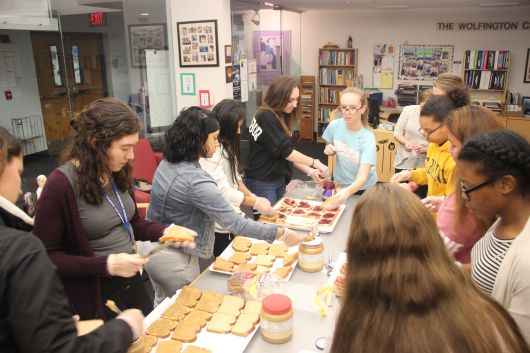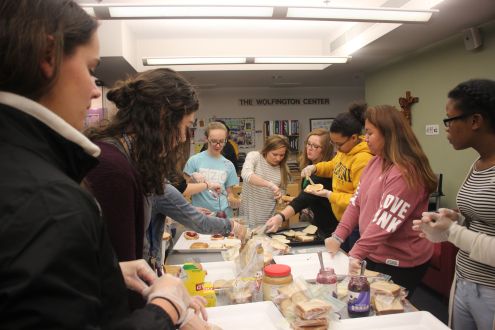Video by Kaitlyn D’Ambrosio.
For many people, the city of Philadelphia is home. Sadly for some, their home does not include a comfortable bed or roof over their head. It may be a street corner, a park bench or a subway station. As the winter season comes around, it gets even harder for people experiencing homelessness.
According to Philadelphia Office of Homeless Services, over 5,000 people are considered homeless in Philadelphia.
Cabrini University’s Campus Ministry does what they can to make the lives of people experiencing homelessness just a little better. Once a month, students meet up in the Wolfington Center to make peanut butter and jelly sandwiches as well as gather snacks and water bottles to transport to Center City so they can hand them out to the people experiencing homelessness.
Father Carl Janicki started the peanut butter and jelly night when he began working here eight years ago. After testing out different days with students involved with campus ministry, they decided that once a month on Friday nights best suited everybody’s schedule.
“You do a lot of good,” Janicki said. “At the end of the day, someone who needed a meal that night was able to get a sandwich and something to eat because of the work that we did.”
Many students come together to make and distribute the sandwiches.
Junior biology majors Brenda Cabrera and Dessire Rosario are the student leaders for peanut butter and jelly night.
Senior international business major Diego Ramirez joins in on peanut butter and jelly night as a peer minister for Campus Ministry.

“I think I started my sophomore year just basically driving the vans,” Ramirez said. “Since I was van certified, they asked me if I would drive the van for them. From there, I really enjoyed it and it became a thing that would go the first Friday of every month.”
The night begins at 5:30 p.m. in the Wolfington Center where Cabrera, Rosario, Ramirez and other people in and out of campus ministry begin preparing sandwiches and making bags of snacks and water to be loaded onto the vans.
“We get together, talk about what we are going to be doing then head out to the city and hand out the sandwiches water and whatever else we have,” Rosario said.
When students distribute food and water to the people, they are able to meet them and hear their stories.
“I had the opportunity to talk with someone who was going through a hard time and his really touched me,” Cabrera said.
“They all have unique stories,” Rosario said. “It wasn’t just one plot.”
Going out to Center City to distribute food to those who need it involves battling the stigma behind people experiencing homelessness.
“A lot of [people] just walk right by them and don’t even acknowledge them, so the fact that we are taking time out of a Friday where most college students might be at a party or something like that and we are going out and purposely going to speak with them,” Ramirez said. “I think it makes them feel good and makes them feel acknowledged.”
“[At Campus Ministry] we call them people experiencing homelessness because we want them to feel like they are people first,” Cabrera said. “We don’t want to use the negative connotation that the word homeless has in today’s society”
Some of the students who continue to take part in peanut butter jelly night have had their perspectives change and are impacted by the work they are doing.
“I like helping people,” Rosario said.
“It feels very special,” Cabrera said. “Just a simple sandwich can change someone’s night. Even a bottle of water as well can go a long way.”
“The first [peanut butter jelly night] was eye opening,” Ramirez said.
Ramirez attended Roman Catholic High School in Center City, Philadelphia and saw people experiencing homelessness everyday.

“I never paid them any mind,” Ramirez said. “I was one of those people who just walked right by them, ignored them, tried not to go near them. Then purposely going up to them and trying to have a conversation with them then realizing that they are just normal people”
“We know we’re not going to solve homelessness,” Janicki said. “Our hope is to meet their immediate needs and to bring them a little dignity and respect at a time when some people just pass them by or walk by and pretend they are not there.”


